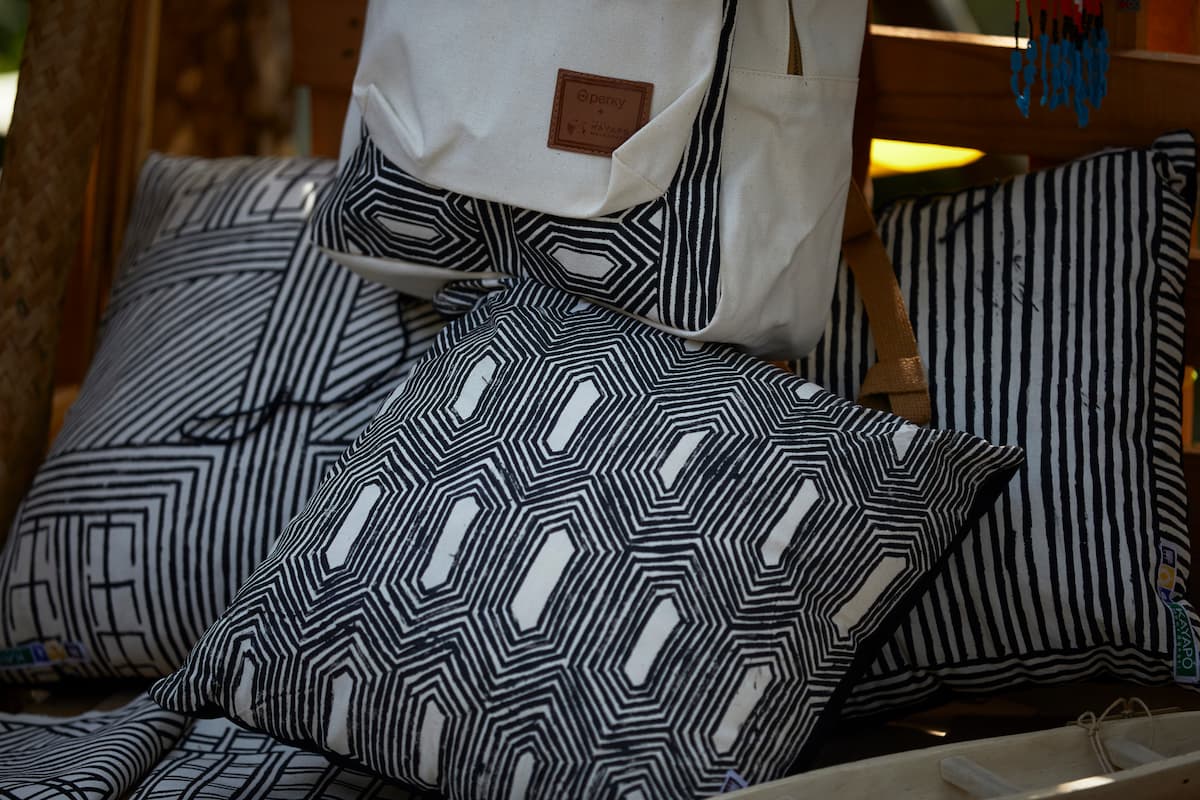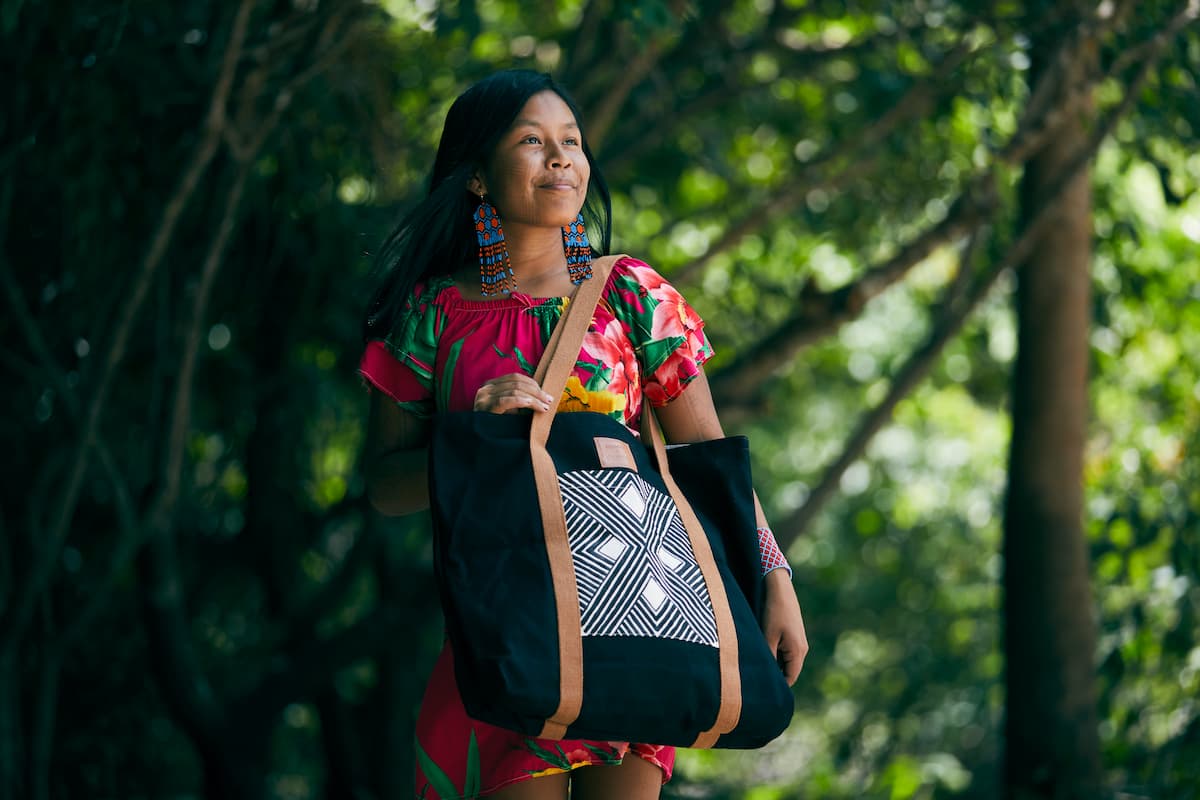Rede Origens Brasil® promotes the connection of forest artisans and brands to value the culture and beauty of native peoples
hundreds of years ago, women from different peoples from the Amazon reserve in their routine the moment to meet to talk, tell experiences and pass on your knowledge, while their hands produce objects that carry part of their history and culture.
Some of these parts are useful for everyday life, others adorn and bring more beauty to the lives of the people around them. Today, That unique and ancestral Brazilian art began to have its value recognized throughout the country, contributing to a fair economy that promotes the maintenance of the forest standing.
As well as the individuality of more than 300 ethnicities from Brazil, Indigenous art performed in the country has a great diversity of objects and styles.. They are Baniwa baskets rich in graphics, hand-painted fabrics by Kayapó artisans, articles in “Teçume” (made from braided straw) from the region of the Amanã Sustainable Development Reserve, Xipaya art made with seeds and wood, ceramics of the Tukano peoples, adornments like earrings, bracelets and necklaces made with glass beads.
All of this is prepared following ancestral traditions., with respect to nature, without taking more from the forest than it is capable of replacing. One of many examples is the handicraft made by the Mebengokrê women., that bears the mark of the body painting of this people and reveals their strong and persevering identity.
To take this art to the rest of the country and to other parts of the world, producers and artisans have been working together with Origens Brasil®, network created by the Institute of Forestry and Agricultural Management and Certification (Imaflora) and Socioenvironmental Institute (ISA) and managed by Imaflora, that connects companies, community organizations and consumers to follow ethical business models that value the forest and its peoples.
Today they are members of the network 3.330 producers directly benefited, moving R$16.1 million with commercial relations between 74 support institutions and community organizations, beyond 35 companies, contributing through ethical and transparent business to support the conservation of 51,8 million hectares of forest made by indigenous peoples and traditional populations. This in the five territories in which it operates: Xingu, North of Pará, Black river, Solimões and Tupi Guaporé, and promoting ethical trade, fair and responsible.
Tucum is one of the companies that make up the network. The platform for indigenous products sells earrings, necklaces, handbags, shirts, cosmetics, baskets, sculptures, among other articles made of fibers, seeds and beads. Every Tucum action seeks to encourage or provide autonomy and income generation for indigenous peoples and traditional communities, advising indigenous organizations on structuring the handicraft production chain, business development.
In addition, also act as commercial partners in the sale of products, through consulting and commercialization of indigenous handicrafts in the marketplace and in partner stores in Brazil and abroad, involving more than 2400 craftswomen and craftsmen 86 communities. “These pieces carry history and a lot of resistance from peoples who were almost decimated and continue to be invaded. His art is a symbol of this resistance, because it is knowledge that has passed through generations, materialize a past that resisted” points out Amanda Santana, founding partner of Tucum.
Another example is Bemglô – collaborative platform that shares products that tell the story of those who make, with affection, proximity and positive impact. Created in 2014, she sells responsible and purposeful brands of low environmental impact and slow fashion, including indigenous art. In addition to being part of the Origens Brasil® network, the company is certified B, marking a business model where social and environmental development are the focus. The company has actress Gloria Pires as a partner and is a reference when it comes to conscious consumption.
Valuing art and the forest
More than just products with beautiful colors, formats or graphics, indigenous art is language, is subjectivity, it is communication that strengthens the identity and culture of the peoples who, by keeping the activity alive, it also maintains its way of life and the forest standing.
“Opening differentiated and ethical markets that demand and value this art, it's more than just generating income for the people of the forest, is to keep alive knowledge and the intangible culture of a people, at the same time that we allow new generations to have contact with the origin of these products that carry so many stories and knowledge” , says Patricia Cota Gomes, manager of the Origens Brasil® network at Imaflora.
Today, being part of the network has helped people to feel recognized and valued, and has been attracting more young people to this job, reinforcing among the new generations the importance of passing on this knowledge, the economic potential of its culture and the value of this work for sustaining the living Amazon.
Sign up to receive Event News
and the Universe of Arts first!
The origin of every indigenous art item on the network can be accessed through a QR code, the Origens Brasil® seal -, the consumer can learn about the stories of the artisans, the territory of origin of the product, their culture and how much they contribute to the conservation of the Amazon Forest. A necessary connection between those who buy and consume in the city with those who produce and conserve in the forest.
Initiatives such as the Origens Brasil® network seek to strengthen production and business chains within Protected Areas as a strategy to keep the forest standing and generate income for traditional populations and indigenous peoples, true guardians of socio-environmental heritage. The network starts from the pillars of the network articulation, technology and communication – bringing the producer closer to companies and the consumer market.
In 2019, the Origens Brasil® network received the International Innovation Award for Sustainable Food and Agriculture (UN International Innovation Award for Sustainable Food and Agriculture), offered during the 41st Conference of the Food and Agriculture Organization of the United Nations (FAO). The initiative was recognized in the main category of the award, focused on innovative projects in the fight against hunger and social inequality in the world.
The Brazil Origins Network® Origens Brasil® enables business in favor of the standing forest with guarantee of origin, traceability, transparency and promoting ethical trade. In 2021 traded more than R$ 2,8 millions through 55 products and contributed to generate income for 2.224 people among riverside people, extractivists, rubber tappers, chestnut trees, eavesdroppers, artisans and indigenous peoples.
About Imaflora
The Forestry and Agricultural Management and Certification Institute – Imaflora – is a non-profit civil association, created in 1995, which was born under the premise that the best way to conserve tropical forests is to give them an economic destination, associated with good management practices and responsible management of natural resources.
Imaflora believes that socio-environmental certification is one of the tools that respond to part of this challenge, with strong inducing power of local development, sustainable, in the forestry and agricultural sectors.
In this way, the Institute seeks to influence the productive chains of forestry and agricultural products; collaborate in the elaboration and implementation of policies of public interest and, finally, do, in fact, the difference in the regions in which it operates, creating models of land use and sustainable development there that can be reproduced in other municipalities, regions or biomes of the country.
More info: www.imaflora.org


